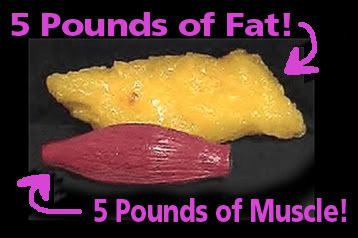Muscle Vs. Fat
Replies
-
We've all seen this picture, but just a reminder that 5 pounds of muscle is much smaller than 5 pounds of fat!

To the OP, I loved your piccies at the bottom :laugh:
To KDiamond, I was thinking about this picture the other day ironically, it is an excellent example for sure :drinker:0 -
Yes, sorta. The water is stored in the muscle so that the muscles can store more glycogen (carbs) to be able to fuel the lifts later. So, while technically you aren't gaining muscle fibers, you are getting bigger looking muscles because of the added glycogen and water stored in the muscles. While it's not really muscle, when doing a body composition analysis, it is counted as lean tissue because it isn't stored body fat. Since we can't differentiate between muscle, bones, organs, and water without an expensive DEXA scan, any added lean body mass is looked at as "muscle" in a gym setting by most people because they can't really tell what it is. That's why you have a lot of people who believe they are gaining muscle really fast, especially as they first get started, because they don't know what they've really gained and neither do a lot of their trainers so they get told they've increased Lean Body Mass and assume it is muscle.
true enough, functionally the only reason to even care about whether it's muscle mass increase or recruitment is because recruitment can be lost far faster. I.E. if you train a muscle to be more efficient, and gain a 5% increase in performance, then immediately stop, within 2 weeks you'll loose most, if not all of that gain (assuming total stoppage of the training) Where as, assuming normal nutrition levels, you can hold on to real muscle mass for months if it's a functional muscle.0
This discussion has been closed.
Categories
- All Categories
- 1.4M Health, Wellness and Goals
- 392.9K Introduce Yourself
- 43.7K Getting Started
- 260.1K Health and Weight Loss
- 175.8K Food and Nutrition
- 47.4K Recipes
- 232.5K Fitness and Exercise
- 415 Sleep, Mindfulness and Overall Wellness
- 6.5K Goal: Maintaining Weight
- 8.5K Goal: Gaining Weight and Body Building
- 152.9K Motivation and Support
- 7.9K Challenges
- 1.3K Debate Club
- 96.3K Chit-Chat
- 2.5K Fun and Games
- 3.6K MyFitnessPal Information
- 23 News and Announcements
- 1.1K Feature Suggestions and Ideas
- 2.5K MyFitnessPal Tech Support Questions

